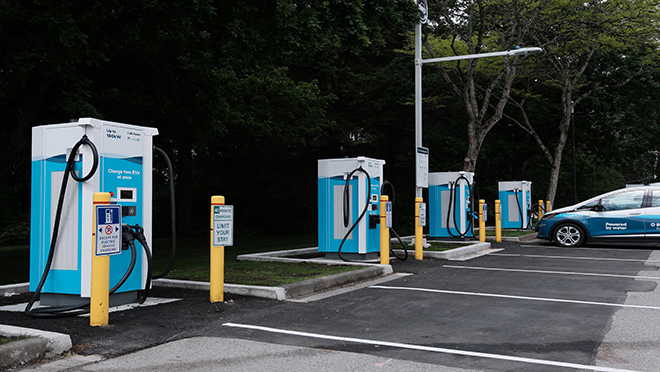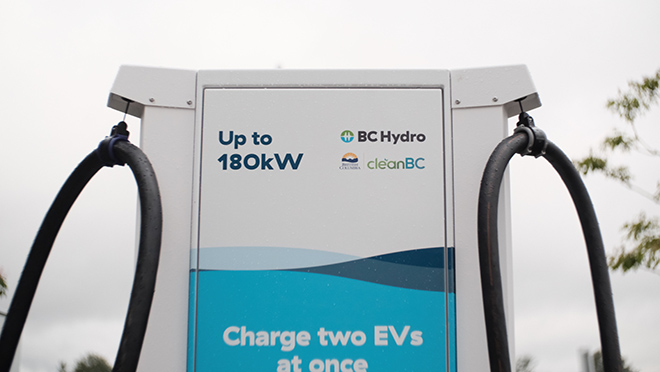Surrey happy to host electric vehicle fast charging hubs

BC Hydro recognizes the City of Surrey as a Clean Energy Champion for their efforts
Part of our Clean Energy Champions series: businesses, homes, and institutions– large and small – recognized for their reduction in their reliance on fossil fuels.
Public fast charging isn't just for those embarking on a road trip in an electric vehicle. There are a whole lot of people in B.C. who want to buy an EV, but don't have access to a charger where they park their car overnight.
Many strata councils are taking advantage of BC Hydro's EV-Ready incentives for apartments and condo buildings, which include everything from planning, to electrical upgrades, to incentives offsetting the cost of the chargers. But it will take time for the majority of buildings to add charging capacity.So Dave Harkness, manager of parking and mobility for the City of Surrey, said it was a perfect fit for the City's sustainability objectives when BC Hydro approached them with the idea of making Surrey the site of B.C.'s first fast-charging hubs.
"Just like every other Metro Vancouver city, there's about 40% of the population that's in multi-unit residential buildings where it can be difficult to put in chargers," says Harkness. "Retrofitting can be expensive and complicated. So public charging fulfills a critical gap, and fast charging is especially helpful in filling that gap."
Four BC Hydro-operated hubs in Surrey, including a four-charger, eight-port station at the Surrey Arts Centre, are due to open this summer. The others are six-charger, 12-port stations at North Surrey Sport & Ice Complex and at Surrey Guildford Recreation Centre, and a four-charger, 8-port station at the Surrey Sport &Leisure Complex on Fraser Highway.
"Surrey has been an early adopter in providing public EV infrastructure and we are starting to see it pay off with more and more people going electric," said Mayor Brenda Locke. "The new fast charging station at Surrey Sport and Leisure is the latest addition to the City's expanding charging network.
"We want people who are thinking about buying an electric car to know there are public charging options available if you don't have a home charger yet. Given the high price of gas and the concerns for our climate, now is the time to make the switch to electric.
As with all our fast-charging stations, drivers who plug in for a fast charge will pay for the convenience of a faster charge. Under new energy-based rates, drivers are charged 34.79 cents per kWh at all fast chargers, and there's a new idle fee that promotes EV charging etiquette. Once your vehicle stops charging, you'll have five minutes to disconnect before a 40-cents-per-minute idle charge kicks in.
The new hubs in Surrey will provide up to 180 kW charging speed and feature power-sharing chargers that will split the power if two vehicles use the same charger. The cost for charging at either a 90 kW session or a full 180 kW session is identical under energy-based charging. Charging an electric vehicle with an average size battery pack (61 kW) from 20% to 80% would cost $13, compared to about $4 for the same top-up on a home charger.
Charging that vehicle from 20% to 80% at a 90 kW charging session would take about 26 minutes. Charging at the full 180 kW rate could halve that time to as little as 13 minutes.
BC Hydro recommends drivers try to limit their time at a public fast charger to a maximum 30 or 40 minutes to free it up for other customers, and to not charge beyond 80%. Charging that last 20% can take as long as it takes to go from 10% to 80%.
"With BC Hydro's new 180 kW fast chargers, a driver can reduce charging times to one half or even one third of earlier fast chargers," says Harkness. "Somebody can come in and, in 20 minutes, 30 minutes, 40 minutes be back up to pretty much a full charge and on their way. That turnaround works well for both charging on the go and charging for EV owners who don't yet have home charging."
Charging with regular household current, sometimes referred to as "trickle charging", can take 12 hours or more to deliver 100 km worth of range to the typical EV. Level 2 chargers, which are the go-to option for most EV owners who install a charger at home, can deliver those 100 km worth of driving in just over three hours. Most DC fast chargers in the BC Hydro network are 50 kW fast-chargers capable of providing 100 km of range in about 30 minutes, but many 100 kW chargers (which would cut that charging time in half to 15 minutes) and 180 kW chargers are being added to the network.
Harkness says the costs of fast charging won't limit their popularity in Surrey.
"Even when fees for fast-chargers in Surrey were first introduced, that didn't diminish how much they were used," said Harkness. "People recognize that there is value in terms of convenience and speed relative to the use of Level 1 and 2 chargers."
Dramatic increases in gas prices have helped make the switch to electric vehicles more practical. Based on average 2024 gas prices in B.C., annual fuel costs for a 2022 Chevy Trax gas car are estimated at $2,800, compared to just $350 to charge a 2022 Chevy Bolt EUV electric over the same distance. Use our fuel savings calculator to get up-to-date comparisons between gas vehicles and EVs.
Surrey targets city-wide carbon pollution to net-zero before 2050
There are no modest goals in the war against carbon emissions in Surrey, where 47% of total GHG emissions come from transportation, and 79% of daily trips are by car. The City aims to have B.C.'s largest public EV charging network, an ever-expanding mix of Level 2 and DC fast chargers.
Surrey wants 100% of personal and shared vehicles in Surrey to be zero emission, something they think they can only accomplish by providing all Surrey residents with access to home, near-home, or workplace charging. Since 2019 all new residential buildings, including single-family homes and apartments, need to be built with capacity and wiring for Level 2 chargers.
ICBC numbers show that while in the more affluent areas of Surrey, between 5% and 8% of vehicles are electric, ownership is closer to 3% in many neighbourhoods. Harkness expects increasing demand for plug-in vehicles – EV adoption per capita in B.C. is the highest in North America – will continue and says auto manufacturers have really lowered purchase costs and increased the availability of electric vehicles.
"It's no longer a case of there being half a dozen EV models available, and brands like Hyundai and Kia are approaching price and performance parity with internal combustion powered vehicles," he says. "For example, in the last year we're seeing t fleet managers at car share companies switch to bulk purchases of EVs. There are now reliable EVs in the $40,000 price range that provide range and features equivalent to conventional vehicles. And the fleet managers know that cost of ownership for these EVs is far less than conventional gas or diesel vehicles."

EVs and e-bikes on the rise, but mass transit remains vital.
The longer-term strategy in Surrey is to ensure there's a mix of transportation options, with mass transit (SkyTrain and bus) working in tandem with electric vehicles, e-bikes and pedal bikes.
But as the price of EVs drops, what's to prevent Surrey residents from continuing to prefer cars over mass transit options? The percentage of Surrey residents driving to work (81%) is well above the Metro Vancouver average of 69%, and passenger vehicle emissions – from the city's 235,000 registered vehicles – account for 38% of Surrey's total emissions.
"We're seeing a positive trend, especially in newer developments, where fewer and fewer residents have cars, and fewer have two cars," says Harkness. "Many aren't using the parking spaces in their building, or they're not buying parking spaces. We see a positive adoption rate of using transit instead."
On top of that, opting out of car ownership – whether it's gas-powered or electric – is now a practical consideration for many people.
"If somebody is trying to achieve home ownership at current mortgage rates, more than ever the cost to own and operate a car enters into the calculation of household expenses," he says. "With so much of Surrey's new residential development focussed around transit corridors, and options such as car share and our new shared electric bike system, opting out of car ownership is becoming a more practical option."
Bus ridership in Surrey increased by 50% between 2015 and 2019, and is up another 15% since. And feet are very much in the mix – walking trips in Surrey grew by 77% between 2011 and 2017.
Meanwhile, the demand for public EV charging is on the rise. The number of plug-in vehicles in Surrey – both battery electric and hybrid plug-ins – has been doubling each year since about 2018.
BC Hydro's fleet incentives include an EV fleet ready funding to hire a fleet electrification expert to perform a fleet assessment and help identify charging requirements and electrical infrastructure needs, along with funding for upgrades to electrical infrastructure for charging, and a fleet pilot project incentive. And the federal government's iMHZEV program offers businesses and organizations up to 10 incentives and/or a maximum of $1 million for the purchase/lease of electric vehicles ranging from pick-ups and cargo vans, to bucket trucks, box trucks, and buses.
Harkness says developers and businesses across Surrey are lobbying the city to provide more EV charging infrastructure, sometimes for surprising reasons.
"We've got four fast chargers from BC Hydro in Cloverdale adjacent to the 176 Street retail row," he says. "The business improvement association (BIA) there loves them. They want us to put more in because they can see what's happening: visitors are making that a destination who otherwise wouldn't have shown up at the barber shop or the Republica Coffee Roasters or one of the other cafes.
"While their car is charging they walk over to the retail street and create foot traffic for retailers and services that you otherwise may not have. The EV chargers are in essence an economic generator."
As for the naysayers reluctant to give up their powerful gas vehicle for an EV, Harkness suggests that all it will take for them to be won over is time behind the wheel of an EV. He loves driving his Jaguar iPace electric – he recently relied on BC Hydro fast charging stations on a trip to Tofino –and says that drivers will be wowed when they discover the torque and acceleration available in an EV.
As if to prove the point, two vehicles recently checked in to BC Hydro's Cloverdale charging station were an F-150 Lightning and a Ford Mustang Mach E. The Lightning is capable of going from 0 to 100 km/h in a dazzling 4.5 seconds, while the Mach-E GT can do it in 4.4 seconds. Even the far more affordable 2019 Chevy Bolt that recently used the station is capable of hitting 100 km/h in 6.5 seconds, about three seconds faster than the similar sized but gas-powered Chevy Trax.
Related: